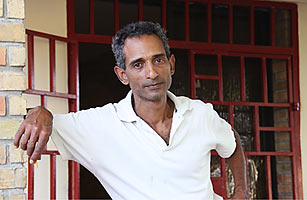
Michael Moscoso, Haitian rum maker
Michael Moscoso is suitably embarrassed about his good fortune. "I feel morally incorrect," he says, ruefully. "People are still dying and I'm [talking about] making rum."
It's true that people are still dying in Leogane, the Haitian town closest to the epicenter of the Jan 12 quake: 80% to 90% of its buildings have either collapsed or are uninhabitable, and there's still no estimate of how many of its 150,000 people perished. Practically every one of its survivors now sleeps in a tent, or in the open. Aid was late in coming. "We were waiting to hear sirens police, ambulance or U.N. but we didnt hear them for five days," says Philippe Bauliere, director of a local school. As a result, little medical attention was available to the injured, many of whom are now on the critical list.
That makes Moscoso, 47, lucky three times over: nobody in his close family has died, his rum factory in the outskirts of town is one of a handful of businesses still standing, and all 25 of his employees are alive. He's pretty sure that with some minor repairs, he can resume production in a couple of weeks.
And resume he will. As sheepish as he feels about making booze while mass graves are still being filled, Moscoso says getting the factory going again is the best contribution he can make to Leogane's recovery. His employees need the work to support their families, and sugarcane farmers need him to buy their crop.
The cane farmers are in a bind: harvesting season is just weeks away, and their principal buyers, the local sugar factory, has been heavily damaged. Since it's a state-owned enterprise and the government is currently in disarray, there's a real fear that the cane crop will rot in the fields.
Moscoso figures that if he can jerry-rig his machinery to double their output to 20 barrels (roughly 110 gallons) a day, he can buy a lot more sugar cane. He says that for every gallon sold, he will set aside $1 for reconstruction. At the very least, that will assuage his sense of guilt.
Haitians take their rum very seriously — it is sold everywhere, at street-side stalls, supermarkets, in gas stations. A common refrain here goes like this, "Haiti can be proud about two things: it's the world's first Black republic and it produces the world's best rum." Moscoso, makes no such claim for his rum, which he sells to blending and bottling companies that in turn sell it on under their labels. But he hopes someday to produce a world-class blend of his own. He has four vats of experimental blends in the living room of his house, which is in the factory compound. He talks excitedly about a blind test he conducted with a professional taster. The expert pronounced three of eight blends of the highest order.
Moscoso talks about his business with the excitement of a relative newcomer. Although his family has made rum for three generations, he took another path, becoming a radio DJ in Port-au-Prince. He only moved to Leogane and the family business two years ago, and set about expanding its ambitions. "My father was surprised I had a flair for this," he says.
He recently started building a large new shed in the compound, and one day he hopes to turn it into a bottling plant. Right now, though, the United Nations has set up emergency medical tents in the shade of the incomplete shed. "They're doing amputations over there," he says. "They helped a woman give birth."
Read more in the new TIME book Earthquake Haiti: Tragedy and Hope and support TIME's Haiti relief efforts.